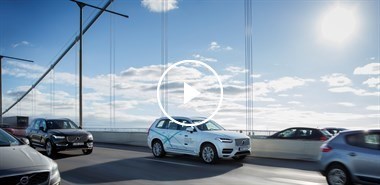The multi-billion pound motor insurance industry faces a period of radical restructuring as a result of the advent of autonomously driving cars, a high-level panel discussion organised by Volvo Cars and Thatcham Research heard yesterday.
Research by Swiss Re and HERE released earlier this month calculated that autonomous drive (AD) technologies could wipe $20 billion off insurance premiums globally by 2020 alone. At present, motor insurance generates 42% of all non-life gross premiums, the largest single slice of global premiums.
Volvo Cars believes that the insurance industry will have no choice but to react to these seismic challenges to its existing business model.
“The medium-to-long-term impact on the insurance industry is likely to be significant," said Hakan Samuelsson, president and chief executive of Volvo Cars, at a seminar held in London entitled ‘A Future with Autonomous Driving Cars – Implications for the Insurance Industry’.
"But let’s not forget the real reason for this – fewer accidents, fewer injuries, fewer fatalities. Autonomous drive technology is the single most important advance in automotive safety to be seen in recent years.”
Peter Shaw, chief executive at Thatcham Research, said: “Vehicle manufacturers are predicting that highly autonomous vehicles, capable of allowing the driver to drop ‘out of the loop’ for certain sections of their journey, will be available from around 2021.
"Without doubt, crash frequency will also dramatically reduce. We’ve already seen this with the adoption of autonomous emergency braking (AEB) on many new cars.
"Research in the US by NHTSA predicts that by 2035, as a result of autonomous and connected cars, crashes will be reduced by 80%.
"Additionally, if a crash unfortunately can’t be avoided, then the impact speed will also drop as a result of the system’s performance – reducing the severity of the crash.”
Volvo Cars last week announced that it will start the UK’s most extensive AD trial, entitled Drive Me London, in 2017, with up to 100 AD cars being driven on real roads by real people, part of its global plush to develop AD cars with similar programmes to be run in Sweden and China.
“The automotive industry cannot do this on its own,” Samuelsson told the seminar.
“We need the Government’s help. It is essential that car makers work with the government to put in place laws and regulations that allow us to get these cars on the road as soon as possible and start saving lives.”
Sajid Javid, UK secretary of state for business, innovation and skills, said: “Driverless cars will see our journeys become faster, cleaner and safer. The UK is leading the way in developing the technology needed to make this a reality thanks to our world-class research base, and these types of trials will become increasingly common.
“Such advances in technology prove the fourth industrial revolution is just around the corner, and our determination to be at the forefront is why we are attracting top names from across the globe for real-world testing.”





















Login to comment
Comments
No comments have been made yet.